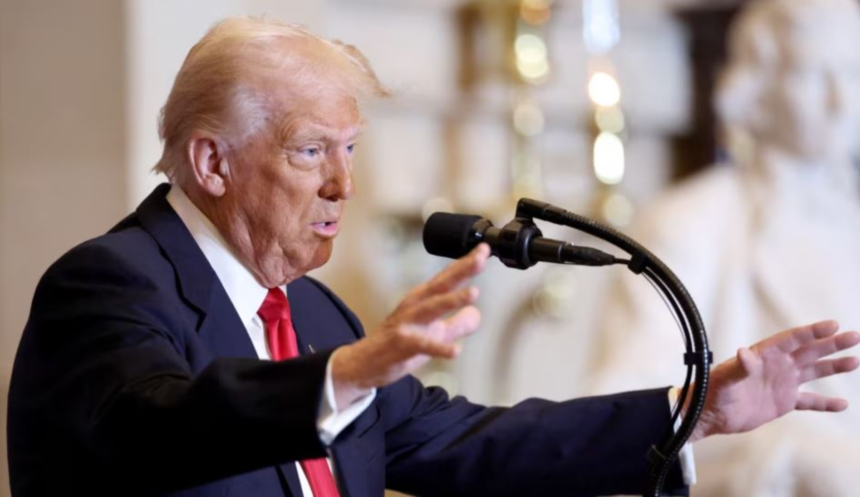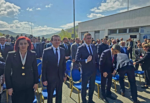The United States and Iran are set to begin negotiations on a new nuclear agreement this Saturday, following a warning from President Donald Trump about potential military action. Tehran responded by cautioning that any strike on Iran could pull the U.S. into a broader conflict in the Middle East.
The talks, which are scheduled to take place in Oman, may mark the first direct or indirect diplomatic engagement between the two countries in over a decade. Iran has stated that the discussions will remain indirect, facilitated by intermediaries representing both sides.
An Iranian delegation led by Foreign Minister Abbas Araghchi arrived in Muscat, the capital of Oman, on Saturday morning, according to Iran’s state news agency IRNA.
President Trump has reportedly given Iran a two-month deadline to accept a deal that would either scale back or completely dismantle its nuclear program.
“I don’t want them to have a nuclear weapon. I want Iran to be a wonderful, happy country, but they cannot have a nuclear weapon,” Trump said aboard Air Force One on his way to Florida Friday night.
These developments come as Iran’s regional influence has been visibly weakened over the past 18 months by Israeli strikes on its proxies, the ousting of Bashar al-Assad in Syria, and unprecedented attacks within Iran’s own borders.
Trump reiterated that military action remains on the table if a new agreement cannot be reached.
“If it takes military force, we will use it,” Trump said Wednesday. “Israel will obviously be very involved. They would likely lead the strike.”
Iran, however, has repeatedly refused to enter negotiations under duress. According to semi-official news agency Tasnim, Iranian officials outlined their “red lines” on Friday, rejecting any “threatening language” or “excessive demands” concerning its nuclear program and defense industry—specifically its ballistic missile capabilities, which U.S. allies in the region view as a security threat.
Steve Witkoff, President Trump’s special envoy for the Middle East, will participate in the talks. His involvement adds another major issue to an already complex diplomatic portfolio, following a recent face-to-face meeting with Russian President Vladimir Putin in St. Petersburg concerning Ukraine.
While the exact agenda remains unclear, Trump has promised to pursue a “stronger” deal than the 2015 Joint Comprehensive Plan of Action (JCPOA) brokered under the Obama administration, which aimed to curb Iran’s nuclear ambitions in exchange for the lifting of Western sanctions.
Trump withdrew from the JCPOA in 2018, calling it a “disastrous deal” that provided funds to a regime that sponsors terrorism. His administration has hinted at pushing Iran to fully dismantle its nuclear program—including its civilian energy component, permitted under the UN nuclear treaty.
Iranian officials have rejected such demands outright, accusing the U.S. of using the nuclear issue as a pretext to weaken and eventually topple the Islamic Republic.
Experts believe Iran sees its nuclear program as its strongest strategic lever, and abandoning it would leave the country dangerously vulnerable.
U.S. officials say the talks may also address a broader range of concerns, including Iran’s ballistic missile program and its support for proxy groups across the region.
“Iran would love to return to something like the JCPOA, so the question is: Are they willing to put anything else on the table?” a senior administration official said.
While Trump has raised the stakes by invoking the possibility of war if talks collapse, other officials have struck a more diplomatic tone.
At the end of last month, Witkoff emphasized that a peaceful solution is possible. In an interview with Tucker Carlson, he highlighted Iran’s vulnerabilities and the strength of the U.S. military—but stressed:
“This isn’t a threat. If the Iranians ever hear this broadcast, I’m not the one threatening. That authority lies with the president.”
A former U.S. official familiar with nuclear talks with Iran said the upcoming meeting is more of a starting point to assess whether meaningful negotiations are even possible.
“Saturday is, at best, a table-setting exercise—to determine if a deal is even viable,” said the former official. “I doubt Iran will show much flexibility. The devil is in the details, and this meeting likely won’t get to the details.”
For now, the State Department cautioned that the meeting is not yet a negotiation. “This is a meeting with a specific purpose,” said spokesperson Tammy Bruce.







